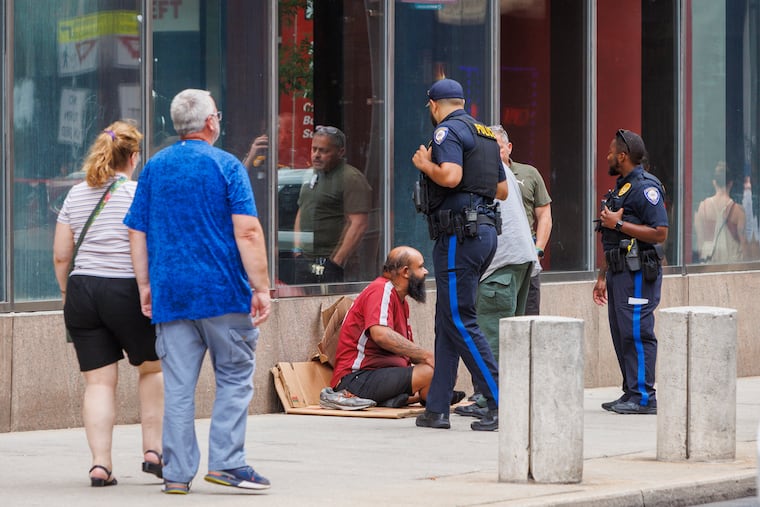Despite Supreme Court ruling, we must not criminalize homelessness
It’s been less than two months since the U.S. Supreme Court’s ruling that cities can ban persons who are homeless from sleeping outside, yet to many, it feels like we’ve gone back decades.

“Years from now, I hope that we will look back on today’s watershed ruling as the turning point in America’s homelessness crisis.” That was the reaction of Theane Evangelis, the lead attorney for the city of Grants Pass, Ore., responding to the U.S. Supreme Court’s ruling that cities can ban people who are homeless from sleeping outside, even if there are no resources or alternatives for them.
Her words are darkly ironic: If this ruling is a historic watershed, it will be that the United States definitely decided criminalizing persons for being homeless is constitutionally and morally acceptable.
It’s been some seven weeks since the court’s decision, yet to many, it feels like we’ve gone back decades.
Only two weeks after the initial shock of the ruling, the realities of its impact began to come into play: California Gov. Gavin Newsom, a liberal Democrat, had ordered the removal of thousands of homeless encampments throughout the state.
We must ensure Philadelphia does not criminalize homelessness in the wake of the ruling.
The legal and moral battle over using policing, laws, and force to remove people from the streets has been fought in communities for decades. Court rulings nationwide have upheld the fundamental human rights of persons who found themselves in situations of homelessness without the necessary resources to overcome struggles such as addiction, mental illness, and especially affordable housing.
» READ MORE: The Supreme Court ‘criminalized’ homelessness. Where is our humanity? | Opinion
While such battles were being fought in the courts of law and of public opinion, many nonprofits and local governments were developing solutions, empowering hundreds of thousands of people to break the cycle of chronic homelessness, and demonstrating that resorting to police and prohibitions was not only inhumane but also mostly unnecessary.
We must ensure Philadelphia does not take steps to criminalize homelessness in the wake of the ruling.
Through effective supportive housing programs, we drastically lowered the rates of homelessness of veterans and young adults. This was a problem that, with the political will and appropriate resources, we could solve — at the same time meeting the needs of persons experiencing homelessness and enhancing quality of life for the entire community.
After much progress in lowering the rates of homelessness, the last several years have seen a dramatic worsening of the affordable housing crunch nationwide as well as new waves of horrific drug epidemics. But as a nation, rather than ramping up efforts to address the human and social crisis, we have regressed in our commitment — and now, in this shocking ruling from our highest court, we have basically codified that there is no ultimate national responsibility to our poorest and more vulnerable citizens.
We have affirmed an approach to homelessness that is basically “us vs. them,” justifying moving people we find undesirable out of sight and out of mind.
» READ MORE: Police crackdown in Kensington won’t help people dealing with homelessness, substance use | Opinion
Criminalizing homelessness is a failed policy. In addition to being cruel and dehumanizing, such policies can burden those who are unhoused with criminal records, warrants from unpaid fines, and disqualification from public housing and other benefits.
Sweeping out encampments, without viable supportive housing, will simply move very vulnerable people to someone else’s backyard, cause more unsafe altercations with police, and fill our costly criminal justice system with sick people rather than criminals. Legally validating these kinds of measures takes us as a society back to the absurdity and barbarism of the debtors’ prisons of the past.
It is now more urgent than ever that we work together on real solutions to assist our fellow citizens.
Given the court’s ruling, however distressing and unwise, it is now more urgent than ever that we work together on real solutions to assist our fellow Philadelphians in getting off the streets and achieving their full potential.
Governments must work with the private sector and the nonprofit community to expand affordable supportive housing and access to effective behavioral health treatment. Faith communities must intensify efforts to provide the moral and spiritual leadership to effect systemic change and open their doors and hearts to those of us who are most struggling.
Here in Philadelphia, we need to work harder than ever to ensure everyone — not only those who are experiencing homelessness — has access to decent, affordable housing, quality health care, meaningful education, and opportunities for employment. We must work on strategies that connect solutions to homelessness with the common good — remembering that America is strongest when we unite in a common vision of We the People.
To go down the path of dehumanizing those who are poor and marginalized is to dehumanize ourselves. This can be a true turning point — when we renew our commitment to the great American vision of the essential equality of all people, recognizing that, as the Rev. Dr. Martin Luther King said: “We are caught in an inescapable network of mutuality, tied in a single garment of destiny. Whatever affects one directly, affects all indirectly.”
This is the vision of a true America, of a beloved community. This is the path home for all of us.
Sister Mary Scullion is the cofounder of Project HOME, an organization that has worked for 35 years to end chronic street homelessness and alleviate poverty in Philadelphia.